Comprehensive Analysis of Evidence-Based Practice and Research Methods
VerifiedAdded on 2020/02/03
|11
|2974
|30
Report
AI Summary
This report delves into the concept of evidence-based practice, emphasizing the integration of research findings, clinical expertise, and patient values in healthcare. It differentiates between quantitative and qualitative research paradigms, outlining their respective ontological stances, data collection methods, and strengths. The report examines the importance of qualitative research in understanding patient perspectives and experiences, particularly in the context of patient-centered care and health behavior. It discusses various data collection methods used in qualitative research and provides a framework for evaluating the quality of qualitative studies. Furthermore, the report highlights the advantages and disadvantages of both quantitative and qualitative research approaches. The reflective essay discusses the meaning of health, the sociological perspectives on health, and the disparities in the Canadian healthcare system, particularly those affecting women and aboriginal populations. It reflects on issues of gender inequality, access to healthcare, and the impact of socioeconomic factors on health outcomes.
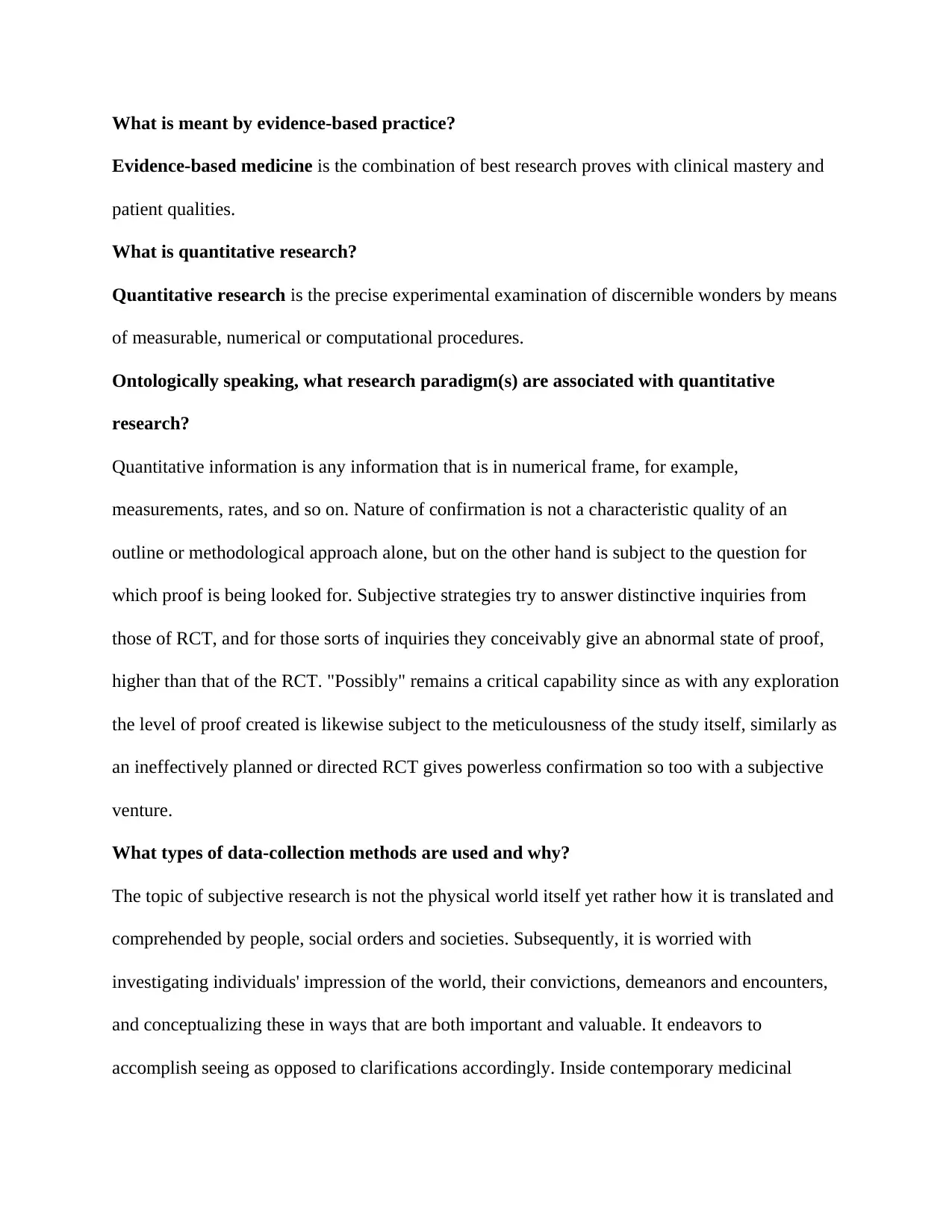
What is meant by evidence-based practice?
Evidence-based medicine is the combination of best research proves with clinical mastery and
patient qualities.
What is quantitative research?
Quantitative research is the precise experimental examination of discernible wonders by means
of measurable, numerical or computational procedures.
Ontologically speaking, what research paradigm(s) are associated with quantitative
research?
Quantitative information is any information that is in numerical frame, for example,
measurements, rates, and so on. Nature of confirmation is not a characteristic quality of an
outline or methodological approach alone, but on the other hand is subject to the question for
which proof is being looked for. Subjective strategies try to answer distinctive inquiries from
those of RCT, and for those sorts of inquiries they conceivably give an abnormal state of proof,
higher than that of the RCT. "Possibly" remains a critical capability since as with any exploration
the level of proof created is likewise subject to the meticulousness of the study itself, similarly as
an ineffectively planned or directed RCT gives powerless confirmation so too with a subjective
venture.
What types of data-collection methods are used and why?
The topic of subjective research is not the physical world itself yet rather how it is translated and
comprehended by people, social orders and societies. Subsequently, it is worried with
investigating individuals' impression of the world, their convictions, demeanors and encounters,
and conceptualizing these in ways that are both important and valuable. It endeavors to
accomplish seeing as opposed to clarifications accordingly. Inside contemporary medicinal
Evidence-based medicine is the combination of best research proves with clinical mastery and
patient qualities.
What is quantitative research?
Quantitative research is the precise experimental examination of discernible wonders by means
of measurable, numerical or computational procedures.
Ontologically speaking, what research paradigm(s) are associated with quantitative
research?
Quantitative information is any information that is in numerical frame, for example,
measurements, rates, and so on. Nature of confirmation is not a characteristic quality of an
outline or methodological approach alone, but on the other hand is subject to the question for
which proof is being looked for. Subjective strategies try to answer distinctive inquiries from
those of RCT, and for those sorts of inquiries they conceivably give an abnormal state of proof,
higher than that of the RCT. "Possibly" remains a critical capability since as with any exploration
the level of proof created is likewise subject to the meticulousness of the study itself, similarly as
an ineffectively planned or directed RCT gives powerless confirmation so too with a subjective
venture.
What types of data-collection methods are used and why?
The topic of subjective research is not the physical world itself yet rather how it is translated and
comprehended by people, social orders and societies. Subsequently, it is worried with
investigating individuals' impression of the world, their convictions, demeanors and encounters,
and conceptualizing these in ways that are both important and valuable. It endeavors to
accomplish seeing as opposed to clarifications accordingly. Inside contemporary medicinal
Paraphrase This Document
Need a fresh take? Get an instant paraphrase of this document with our AI Paraphraser
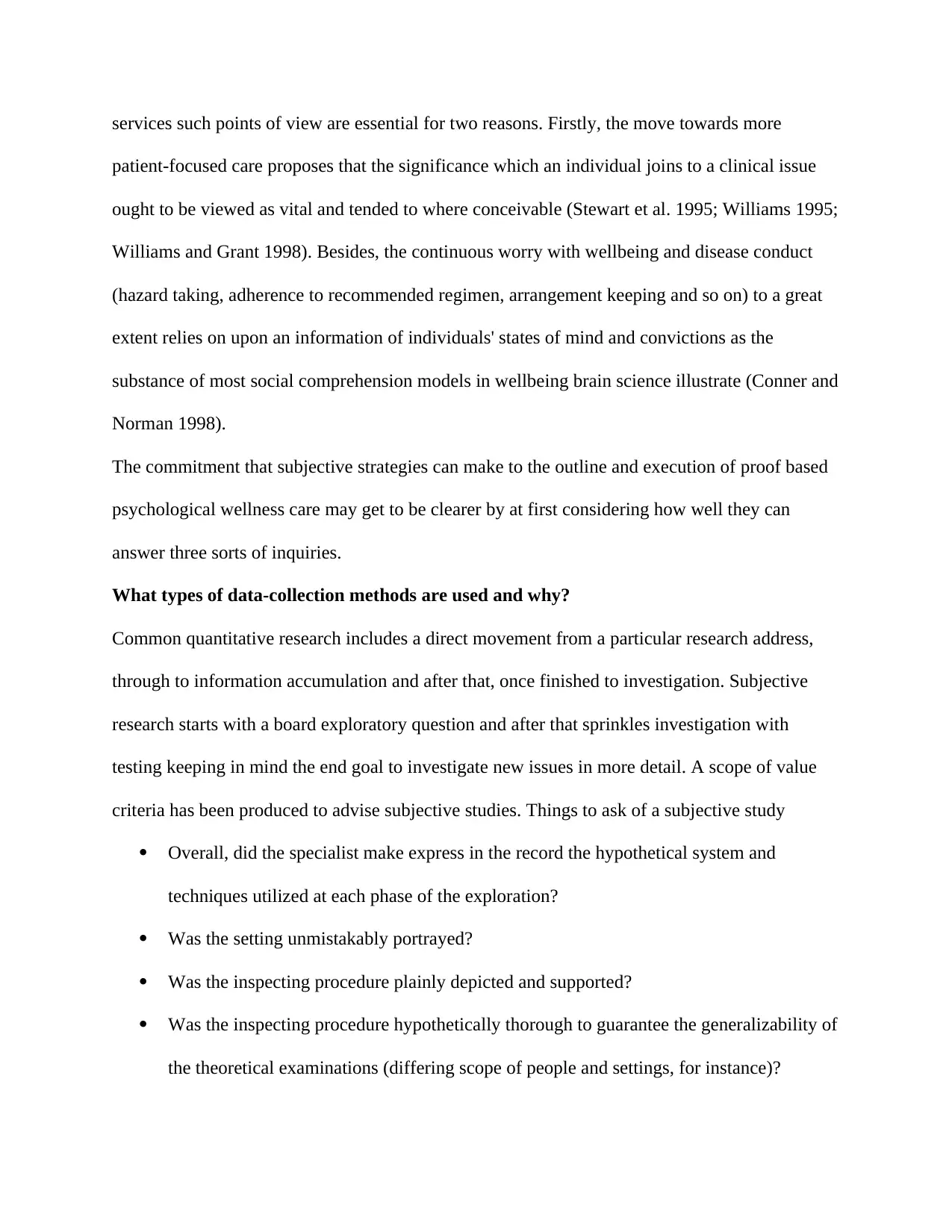
services such points of view are essential for two reasons. Firstly, the move towards more
patient-focused care proposes that the significance which an individual joins to a clinical issue
ought to be viewed as vital and tended to where conceivable (Stewart et al. 1995; Williams 1995;
Williams and Grant 1998). Besides, the continuous worry with wellbeing and disease conduct
(hazard taking, adherence to recommended regimen, arrangement keeping and so on) to a great
extent relies on upon an information of individuals' states of mind and convictions as the
substance of most social comprehension models in wellbeing brain science illustrate (Conner and
Norman 1998).
The commitment that subjective strategies can make to the outline and execution of proof based
psychological wellness care may get to be clearer by at first considering how well they can
answer three sorts of inquiries.
What types of data-collection methods are used and why?
Common quantitative research includes a direct movement from a particular research address,
through to information accumulation and after that, once finished to investigation. Subjective
research starts with a board exploratory question and after that sprinkles investigation with
testing keeping in mind the end goal to investigate new issues in more detail. A scope of value
criteria has been produced to advise subjective studies. Things to ask of a subjective study
Overall, did the specialist make express in the record the hypothetical system and
techniques utilized at each phase of the exploration?
Was the setting unmistakably portrayed?
Was the inspecting procedure plainly depicted and supported?
Was the inspecting procedure hypothetically thorough to guarantee the generalizability of
the theoretical examinations (differing scope of people and settings, for instance)?
patient-focused care proposes that the significance which an individual joins to a clinical issue
ought to be viewed as vital and tended to where conceivable (Stewart et al. 1995; Williams 1995;
Williams and Grant 1998). Besides, the continuous worry with wellbeing and disease conduct
(hazard taking, adherence to recommended regimen, arrangement keeping and so on) to a great
extent relies on upon an information of individuals' states of mind and convictions as the
substance of most social comprehension models in wellbeing brain science illustrate (Conner and
Norman 1998).
The commitment that subjective strategies can make to the outline and execution of proof based
psychological wellness care may get to be clearer by at first considering how well they can
answer three sorts of inquiries.
What types of data-collection methods are used and why?
Common quantitative research includes a direct movement from a particular research address,
through to information accumulation and after that, once finished to investigation. Subjective
research starts with a board exploratory question and after that sprinkles investigation with
testing keeping in mind the end goal to investigate new issues in more detail. A scope of value
criteria has been produced to advise subjective studies. Things to ask of a subjective study
Overall, did the specialist make express in the record the hypothetical system and
techniques utilized at each phase of the exploration?
Was the setting unmistakably portrayed?
Was the inspecting procedure plainly depicted and supported?
Was the inspecting procedure hypothetically thorough to guarantee the generalizability of
the theoretical examinations (differing scope of people and settings, for instance)?
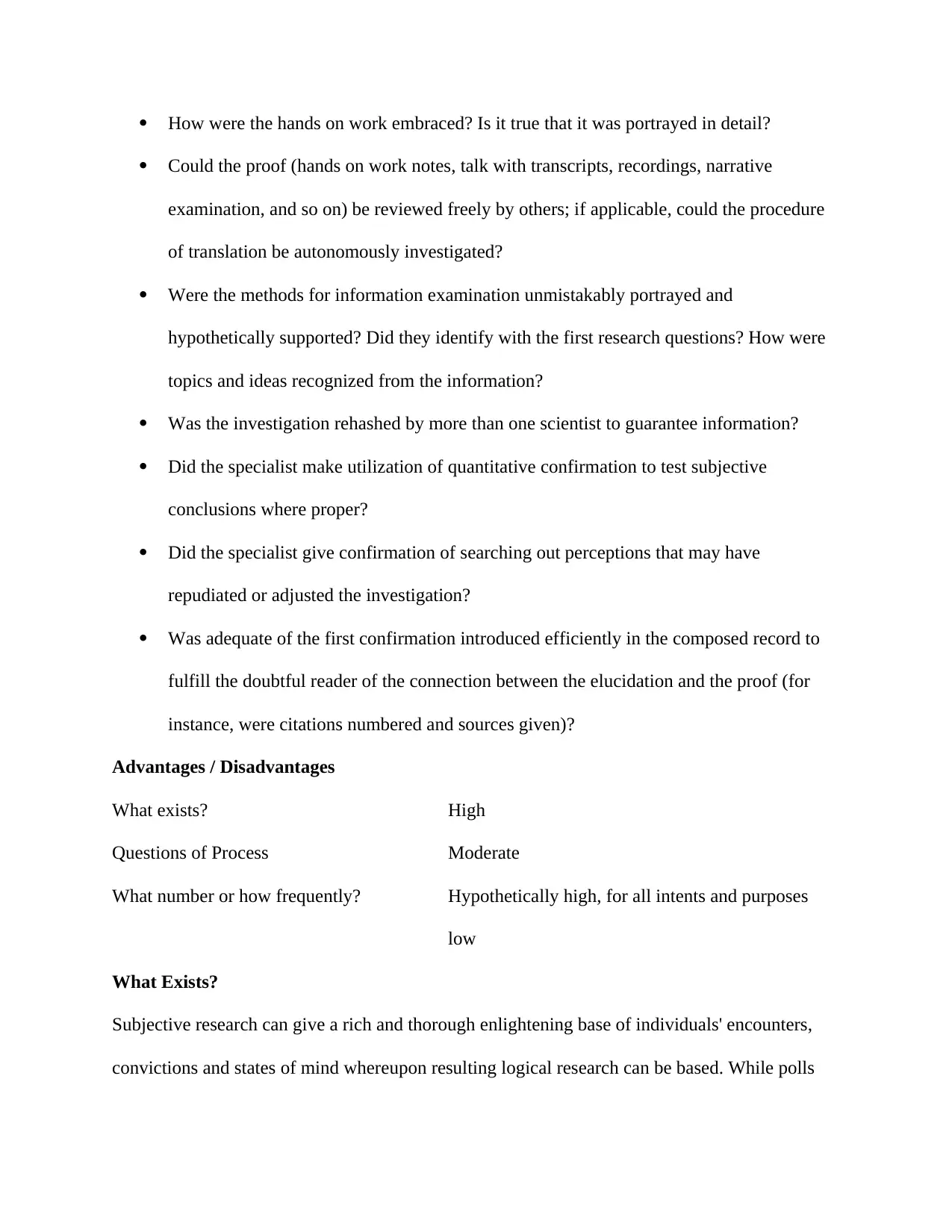
How were the hands on work embraced? Is it true that it was portrayed in detail?
Could the proof (hands on work notes, talk with transcripts, recordings, narrative
examination, and so on) be reviewed freely by others; if applicable, could the procedure
of translation be autonomously investigated?
Were the methods for information examination unmistakably portrayed and
hypothetically supported? Did they identify with the first research questions? How were
topics and ideas recognized from the information?
Was the investigation rehashed by more than one scientist to guarantee information?
Did the specialist make utilization of quantitative confirmation to test subjective
conclusions where proper?
Did the specialist give confirmation of searching out perceptions that may have
repudiated or adjusted the investigation?
Was adequate of the first confirmation introduced efficiently in the composed record to
fulfill the doubtful reader of the connection between the elucidation and the proof (for
instance, were citations numbered and sources given)?
Advantages / Disadvantages
What exists? High
Questions of Process Moderate
What number or how frequently? Hypothetically high, for all intents and purposes
low
What Exists?
Subjective research can give a rich and thorough enlightening base of individuals' encounters,
convictions and states of mind whereupon resulting logical research can be based. While polls
Could the proof (hands on work notes, talk with transcripts, recordings, narrative
examination, and so on) be reviewed freely by others; if applicable, could the procedure
of translation be autonomously investigated?
Were the methods for information examination unmistakably portrayed and
hypothetically supported? Did they identify with the first research questions? How were
topics and ideas recognized from the information?
Was the investigation rehashed by more than one scientist to guarantee information?
Did the specialist make utilization of quantitative confirmation to test subjective
conclusions where proper?
Did the specialist give confirmation of searching out perceptions that may have
repudiated or adjusted the investigation?
Was adequate of the first confirmation introduced efficiently in the composed record to
fulfill the doubtful reader of the connection between the elucidation and the proof (for
instance, were citations numbered and sources given)?
Advantages / Disadvantages
What exists? High
Questions of Process Moderate
What number or how frequently? Hypothetically high, for all intents and purposes
low
What Exists?
Subjective research can give a rich and thorough enlightening base of individuals' encounters,
convictions and states of mind whereupon resulting logical research can be based. While polls
⊘ This is a preview!⊘
Do you want full access?
Subscribe today to unlock all pages.

Trusted by 1+ million students worldwide
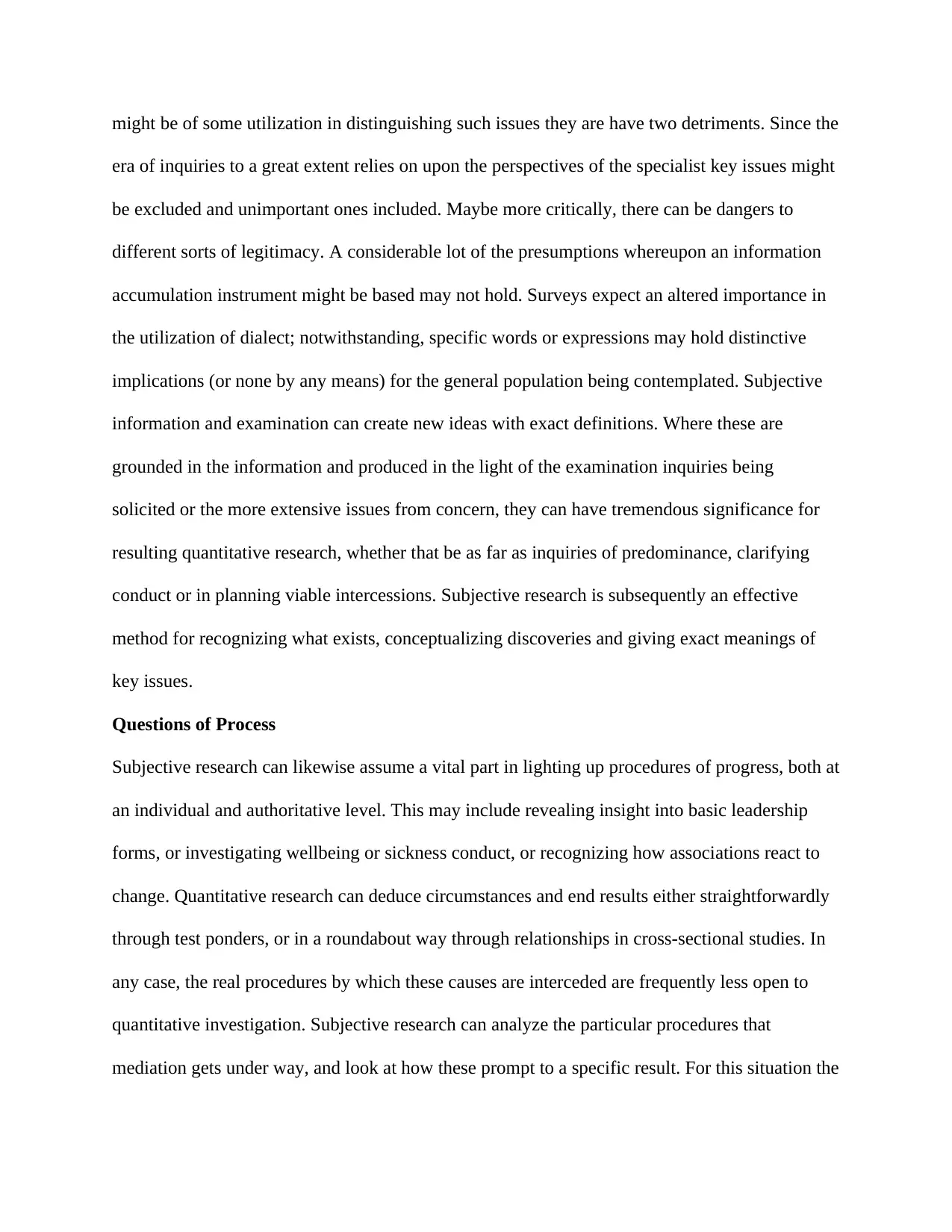
might be of some utilization in distinguishing such issues they are have two detriments. Since the
era of inquiries to a great extent relies on upon the perspectives of the specialist key issues might
be excluded and unimportant ones included. Maybe more critically, there can be dangers to
different sorts of legitimacy. A considerable lot of the presumptions whereupon an information
accumulation instrument might be based may not hold. Surveys expect an altered importance in
the utilization of dialect; notwithstanding, specific words or expressions may hold distinctive
implications (or none by any means) for the general population being contemplated. Subjective
information and examination can create new ideas with exact definitions. Where these are
grounded in the information and produced in the light of the examination inquiries being
solicited or the more extensive issues from concern, they can have tremendous significance for
resulting quantitative research, whether that be as far as inquiries of predominance, clarifying
conduct or in planning viable intercessions. Subjective research is subsequently an effective
method for recognizing what exists, conceptualizing discoveries and giving exact meanings of
key issues.
Questions of Process
Subjective research can likewise assume a vital part in lighting up procedures of progress, both at
an individual and authoritative level. This may include revealing insight into basic leadership
forms, or investigating wellbeing or sickness conduct, or recognizing how associations react to
change. Quantitative research can deduce circumstances and end results either straightforwardly
through test ponders, or in a roundabout way through relationships in cross-sectional studies. In
any case, the real procedures by which these causes are interceded are frequently less open to
quantitative investigation. Subjective research can analyze the particular procedures that
mediation gets under way, and look at how these prompt to a specific result. For this situation the
era of inquiries to a great extent relies on upon the perspectives of the specialist key issues might
be excluded and unimportant ones included. Maybe more critically, there can be dangers to
different sorts of legitimacy. A considerable lot of the presumptions whereupon an information
accumulation instrument might be based may not hold. Surveys expect an altered importance in
the utilization of dialect; notwithstanding, specific words or expressions may hold distinctive
implications (or none by any means) for the general population being contemplated. Subjective
information and examination can create new ideas with exact definitions. Where these are
grounded in the information and produced in the light of the examination inquiries being
solicited or the more extensive issues from concern, they can have tremendous significance for
resulting quantitative research, whether that be as far as inquiries of predominance, clarifying
conduct or in planning viable intercessions. Subjective research is subsequently an effective
method for recognizing what exists, conceptualizing discoveries and giving exact meanings of
key issues.
Questions of Process
Subjective research can likewise assume a vital part in lighting up procedures of progress, both at
an individual and authoritative level. This may include revealing insight into basic leadership
forms, or investigating wellbeing or sickness conduct, or recognizing how associations react to
change. Quantitative research can deduce circumstances and end results either straightforwardly
through test ponders, or in a roundabout way through relationships in cross-sectional studies. In
any case, the real procedures by which these causes are interceded are frequently less open to
quantitative investigation. Subjective research can analyze the particular procedures that
mediation gets under way, and look at how these prompt to a specific result. For this situation the
Paraphrase This Document
Need a fresh take? Get an instant paraphrase of this document with our AI Paraphraser
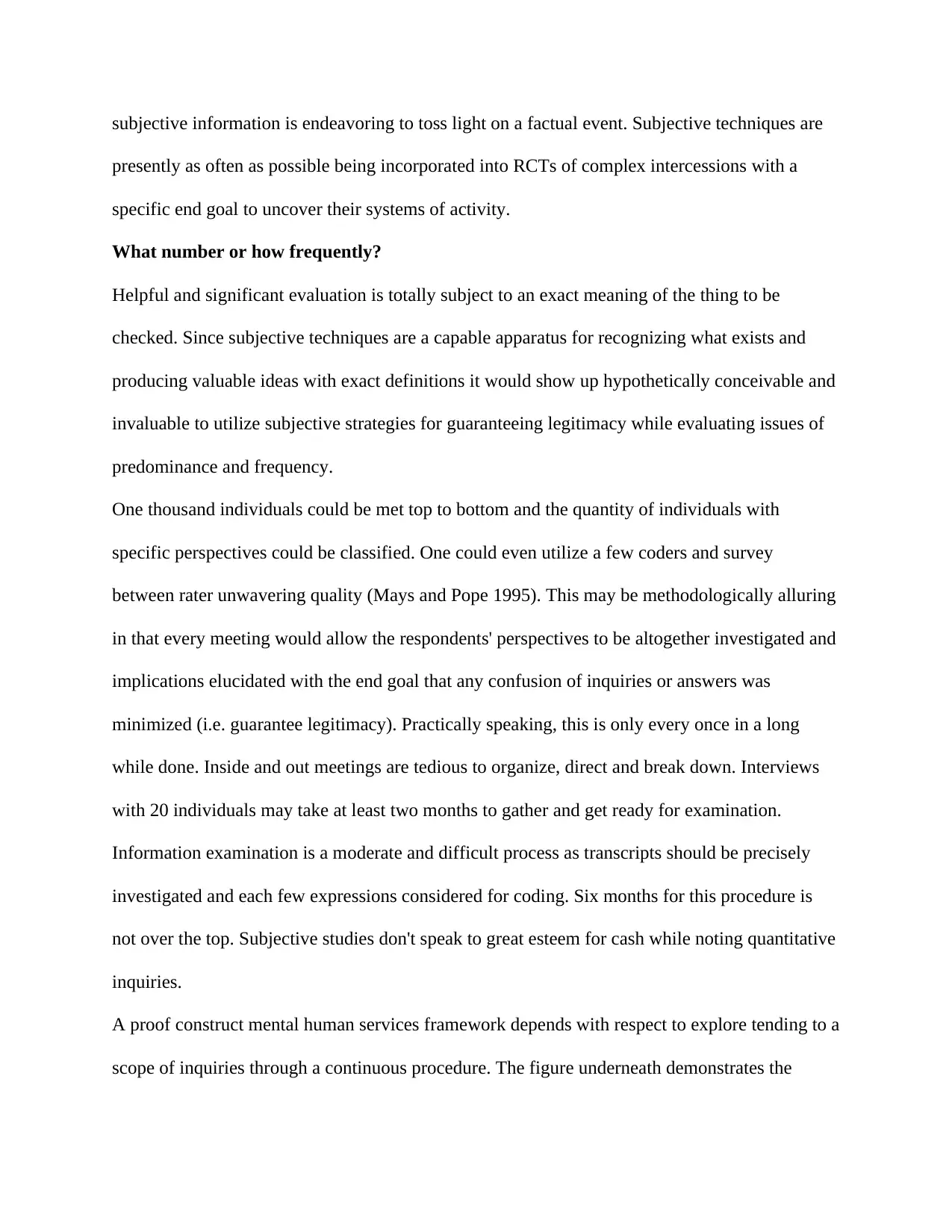
subjective information is endeavoring to toss light on a factual event. Subjective techniques are
presently as often as possible being incorporated into RCTs of complex intercessions with a
specific end goal to uncover their systems of activity.
What number or how frequently?
Helpful and significant evaluation is totally subject to an exact meaning of the thing to be
checked. Since subjective techniques are a capable apparatus for recognizing what exists and
producing valuable ideas with exact definitions it would show up hypothetically conceivable and
invaluable to utilize subjective strategies for guaranteeing legitimacy while evaluating issues of
predominance and frequency.
One thousand individuals could be met top to bottom and the quantity of individuals with
specific perspectives could be classified. One could even utilize a few coders and survey
between rater unwavering quality (Mays and Pope 1995). This may be methodologically alluring
in that every meeting would allow the respondents' perspectives to be altogether investigated and
implications elucidated with the end goal that any confusion of inquiries or answers was
minimized (i.e. guarantee legitimacy). Practically speaking, this is only every once in a long
while done. Inside and out meetings are tedious to organize, direct and break down. Interviews
with 20 individuals may take at least two months to gather and get ready for examination.
Information examination is a moderate and difficult process as transcripts should be precisely
investigated and each few expressions considered for coding. Six months for this procedure is
not over the top. Subjective studies don't speak to great esteem for cash while noting quantitative
inquiries.
A proof construct mental human services framework depends with respect to explore tending to a
scope of inquiries through a continuous procedure. The figure underneath demonstrates the
presently as often as possible being incorporated into RCTs of complex intercessions with a
specific end goal to uncover their systems of activity.
What number or how frequently?
Helpful and significant evaluation is totally subject to an exact meaning of the thing to be
checked. Since subjective techniques are a capable apparatus for recognizing what exists and
producing valuable ideas with exact definitions it would show up hypothetically conceivable and
invaluable to utilize subjective strategies for guaranteeing legitimacy while evaluating issues of
predominance and frequency.
One thousand individuals could be met top to bottom and the quantity of individuals with
specific perspectives could be classified. One could even utilize a few coders and survey
between rater unwavering quality (Mays and Pope 1995). This may be methodologically alluring
in that every meeting would allow the respondents' perspectives to be altogether investigated and
implications elucidated with the end goal that any confusion of inquiries or answers was
minimized (i.e. guarantee legitimacy). Practically speaking, this is only every once in a long
while done. Inside and out meetings are tedious to organize, direct and break down. Interviews
with 20 individuals may take at least two months to gather and get ready for examination.
Information examination is a moderate and difficult process as transcripts should be precisely
investigated and each few expressions considered for coding. Six months for this procedure is
not over the top. Subjective studies don't speak to great esteem for cash while noting quantitative
inquiries.
A proof construct mental human services framework depends with respect to explore tending to a
scope of inquiries through a continuous procedure. The figure underneath demonstrates the
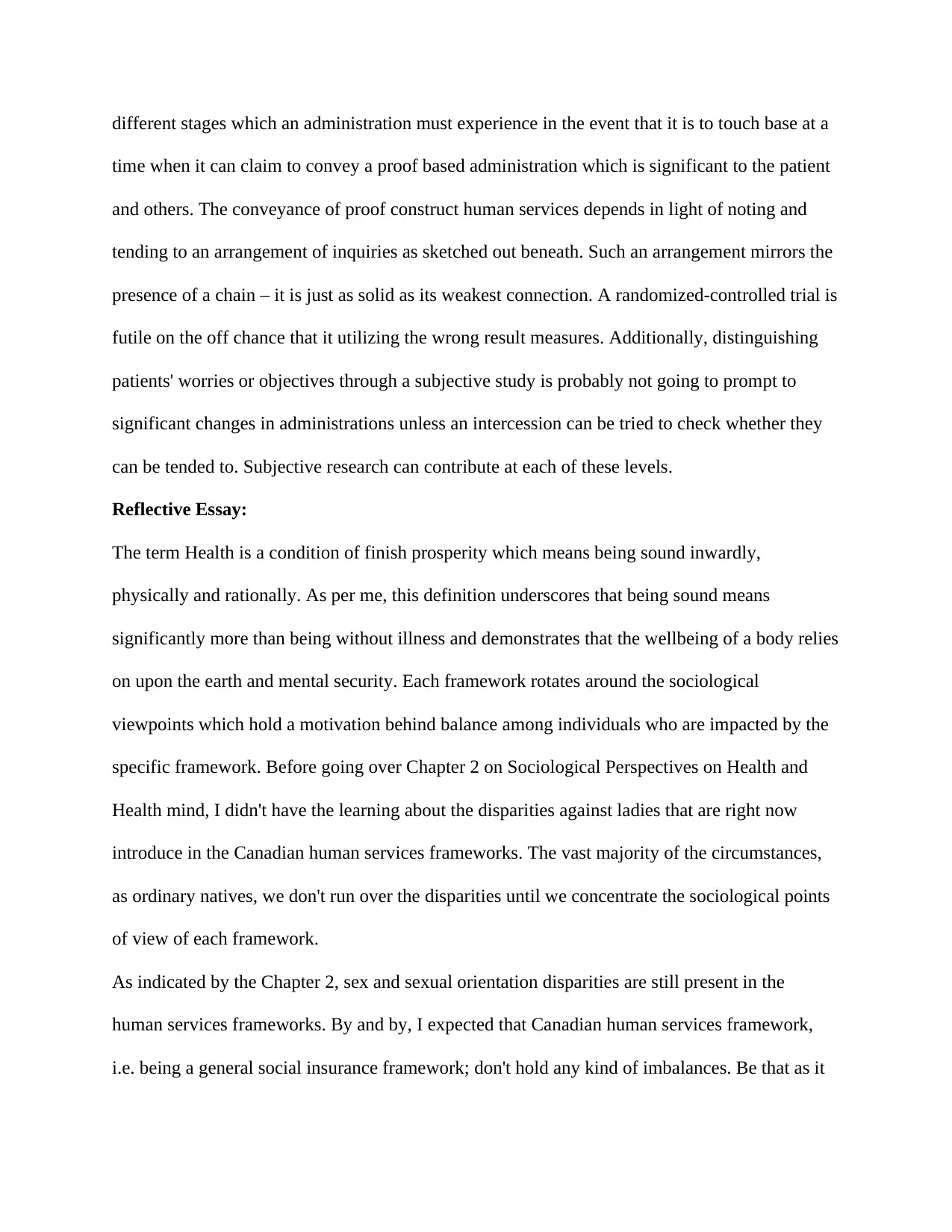
different stages which an administration must experience in the event that it is to touch base at a
time when it can claim to convey a proof based administration which is significant to the patient
and others. The conveyance of proof construct human services depends in light of noting and
tending to an arrangement of inquiries as sketched out beneath. Such an arrangement mirrors the
presence of a chain – it is just as solid as its weakest connection. A randomized-controlled trial is
futile on the off chance that it utilizing the wrong result measures. Additionally, distinguishing
patients' worries or objectives through a subjective study is probably not going to prompt to
significant changes in administrations unless an intercession can be tried to check whether they
can be tended to. Subjective research can contribute at each of these levels.
Reflective Essay:
The term Health is a condition of finish prosperity which means being sound inwardly,
physically and rationally. As per me, this definition underscores that being sound means
significantly more than being without illness and demonstrates that the wellbeing of a body relies
on upon the earth and mental security. Each framework rotates around the sociological
viewpoints which hold a motivation behind balance among individuals who are impacted by the
specific framework. Before going over Chapter 2 on Sociological Perspectives on Health and
Health mind, I didn't have the learning about the disparities against ladies that are right now
introduce in the Canadian human services frameworks. The vast majority of the circumstances,
as ordinary natives, we don't run over the disparities until we concentrate the sociological points
of view of each framework.
As indicated by the Chapter 2, sex and sexual orientation disparities are still present in the
human services frameworks. By and by, I expected that Canadian human services framework,
i.e. being a general social insurance framework; don't hold any kind of imbalances. Be that as it
time when it can claim to convey a proof based administration which is significant to the patient
and others. The conveyance of proof construct human services depends in light of noting and
tending to an arrangement of inquiries as sketched out beneath. Such an arrangement mirrors the
presence of a chain – it is just as solid as its weakest connection. A randomized-controlled trial is
futile on the off chance that it utilizing the wrong result measures. Additionally, distinguishing
patients' worries or objectives through a subjective study is probably not going to prompt to
significant changes in administrations unless an intercession can be tried to check whether they
can be tended to. Subjective research can contribute at each of these levels.
Reflective Essay:
The term Health is a condition of finish prosperity which means being sound inwardly,
physically and rationally. As per me, this definition underscores that being sound means
significantly more than being without illness and demonstrates that the wellbeing of a body relies
on upon the earth and mental security. Each framework rotates around the sociological
viewpoints which hold a motivation behind balance among individuals who are impacted by the
specific framework. Before going over Chapter 2 on Sociological Perspectives on Health and
Health mind, I didn't have the learning about the disparities against ladies that are right now
introduce in the Canadian human services frameworks. The vast majority of the circumstances,
as ordinary natives, we don't run over the disparities until we concentrate the sociological points
of view of each framework.
As indicated by the Chapter 2, sex and sexual orientation disparities are still present in the
human services frameworks. By and by, I expected that Canadian human services framework,
i.e. being a general social insurance framework; don't hold any kind of imbalances. Be that as it
⊘ This is a preview!⊘
Do you want full access?
Subscribe today to unlock all pages.

Trusted by 1+ million students worldwide
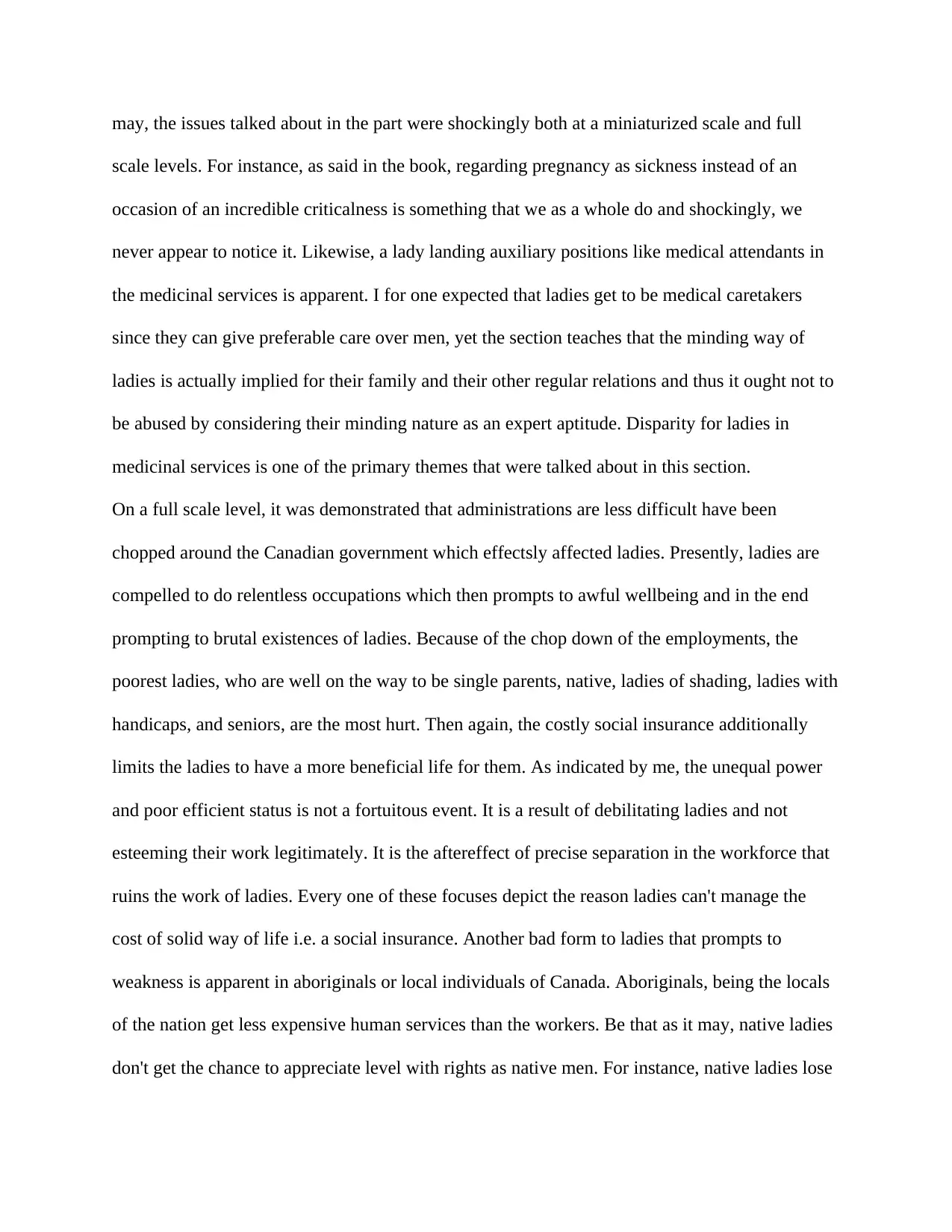
may, the issues talked about in the part were shockingly both at a miniaturized scale and full
scale levels. For instance, as said in the book, regarding pregnancy as sickness instead of an
occasion of an incredible criticalness is something that we as a whole do and shockingly, we
never appear to notice it. Likewise, a lady landing auxiliary positions like medical attendants in
the medicinal services is apparent. I for one expected that ladies get to be medical caretakers
since they can give preferable care over men, yet the section teaches that the minding way of
ladies is actually implied for their family and their other regular relations and thus it ought not to
be abused by considering their minding nature as an expert aptitude. Disparity for ladies in
medicinal services is one of the primary themes that were talked about in this section.
On a full scale level, it was demonstrated that administrations are less difficult have been
chopped around the Canadian government which effectsly affected ladies. Presently, ladies are
compelled to do relentless occupations which then prompts to awful wellbeing and in the end
prompting to brutal existences of ladies. Because of the chop down of the employments, the
poorest ladies, who are well on the way to be single parents, native, ladies of shading, ladies with
handicaps, and seniors, are the most hurt. Then again, the costly social insurance additionally
limits the ladies to have a more beneficial life for them. As indicated by me, the unequal power
and poor efficient status is not a fortuitous event. It is a result of debilitating ladies and not
esteeming their work legitimately. It is the aftereffect of precise separation in the workforce that
ruins the work of ladies. Every one of these focuses depict the reason ladies can't manage the
cost of solid way of life i.e. a social insurance. Another bad form to ladies that prompts to
weakness is apparent in aboriginals or local individuals of Canada. Aboriginals, being the locals
of the nation get less expensive human services than the workers. Be that as it may, native ladies
don't get the chance to appreciate level with rights as native men. For instance, native ladies lose
scale levels. For instance, as said in the book, regarding pregnancy as sickness instead of an
occasion of an incredible criticalness is something that we as a whole do and shockingly, we
never appear to notice it. Likewise, a lady landing auxiliary positions like medical attendants in
the medicinal services is apparent. I for one expected that ladies get to be medical caretakers
since they can give preferable care over men, yet the section teaches that the minding way of
ladies is actually implied for their family and their other regular relations and thus it ought not to
be abused by considering their minding nature as an expert aptitude. Disparity for ladies in
medicinal services is one of the primary themes that were talked about in this section.
On a full scale level, it was demonstrated that administrations are less difficult have been
chopped around the Canadian government which effectsly affected ladies. Presently, ladies are
compelled to do relentless occupations which then prompts to awful wellbeing and in the end
prompting to brutal existences of ladies. Because of the chop down of the employments, the
poorest ladies, who are well on the way to be single parents, native, ladies of shading, ladies with
handicaps, and seniors, are the most hurt. Then again, the costly social insurance additionally
limits the ladies to have a more beneficial life for them. As indicated by me, the unequal power
and poor efficient status is not a fortuitous event. It is a result of debilitating ladies and not
esteeming their work legitimately. It is the aftereffect of precise separation in the workforce that
ruins the work of ladies. Every one of these focuses depict the reason ladies can't manage the
cost of solid way of life i.e. a social insurance. Another bad form to ladies that prompts to
weakness is apparent in aboriginals or local individuals of Canada. Aboriginals, being the locals
of the nation get less expensive human services than the workers. Be that as it may, native ladies
don't get the chance to appreciate level with rights as native men. For instance, native ladies lose
Paraphrase This Document
Need a fresh take? Get an instant paraphrase of this document with our AI Paraphraser
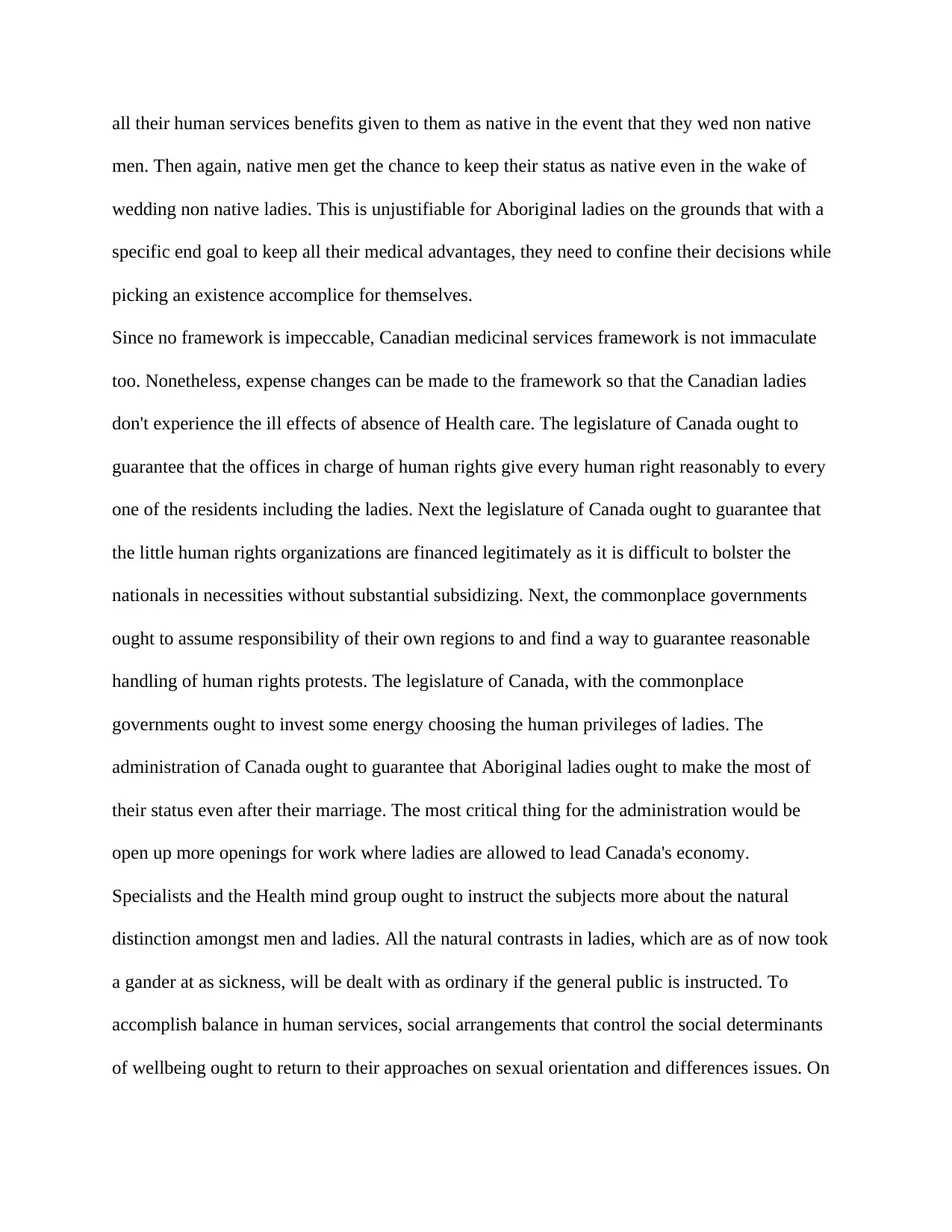
all their human services benefits given to them as native in the event that they wed non native
men. Then again, native men get the chance to keep their status as native even in the wake of
wedding non native ladies. This is unjustifiable for Aboriginal ladies on the grounds that with a
specific end goal to keep all their medical advantages, they need to confine their decisions while
picking an existence accomplice for themselves.
Since no framework is impeccable, Canadian medicinal services framework is not immaculate
too. Nonetheless, expense changes can be made to the framework so that the Canadian ladies
don't experience the ill effects of absence of Health care. The legislature of Canada ought to
guarantee that the offices in charge of human rights give every human right reasonably to every
one of the residents including the ladies. Next the legislature of Canada ought to guarantee that
the little human rights organizations are financed legitimately as it is difficult to bolster the
nationals in necessities without substantial subsidizing. Next, the commonplace governments
ought to assume responsibility of their own regions to and find a way to guarantee reasonable
handling of human rights protests. The legislature of Canada, with the commonplace
governments ought to invest some energy choosing the human privileges of ladies. The
administration of Canada ought to guarantee that Aboriginal ladies ought to make the most of
their status even after their marriage. The most critical thing for the administration would be
open up more openings for work where ladies are allowed to lead Canada's economy.
Specialists and the Health mind group ought to instruct the subjects more about the natural
distinction amongst men and ladies. All the natural contrasts in ladies, which are as of now took
a gander at as sickness, will be dealt with as ordinary if the general public is instructed. To
accomplish balance in human services, social arrangements that control the social determinants
of wellbeing ought to return to their approaches on sexual orientation and differences issues. On
men. Then again, native men get the chance to keep their status as native even in the wake of
wedding non native ladies. This is unjustifiable for Aboriginal ladies on the grounds that with a
specific end goal to keep all their medical advantages, they need to confine their decisions while
picking an existence accomplice for themselves.
Since no framework is impeccable, Canadian medicinal services framework is not immaculate
too. Nonetheless, expense changes can be made to the framework so that the Canadian ladies
don't experience the ill effects of absence of Health care. The legislature of Canada ought to
guarantee that the offices in charge of human rights give every human right reasonably to every
one of the residents including the ladies. Next the legislature of Canada ought to guarantee that
the little human rights organizations are financed legitimately as it is difficult to bolster the
nationals in necessities without substantial subsidizing. Next, the commonplace governments
ought to assume responsibility of their own regions to and find a way to guarantee reasonable
handling of human rights protests. The legislature of Canada, with the commonplace
governments ought to invest some energy choosing the human privileges of ladies. The
administration of Canada ought to guarantee that Aboriginal ladies ought to make the most of
their status even after their marriage. The most critical thing for the administration would be
open up more openings for work where ladies are allowed to lead Canada's economy.
Specialists and the Health mind group ought to instruct the subjects more about the natural
distinction amongst men and ladies. All the natural contrasts in ladies, which are as of now took
a gander at as sickness, will be dealt with as ordinary if the general public is instructed. To
accomplish balance in human services, social arrangements that control the social determinants
of wellbeing ought to return to their approaches on sexual orientation and differences issues. On
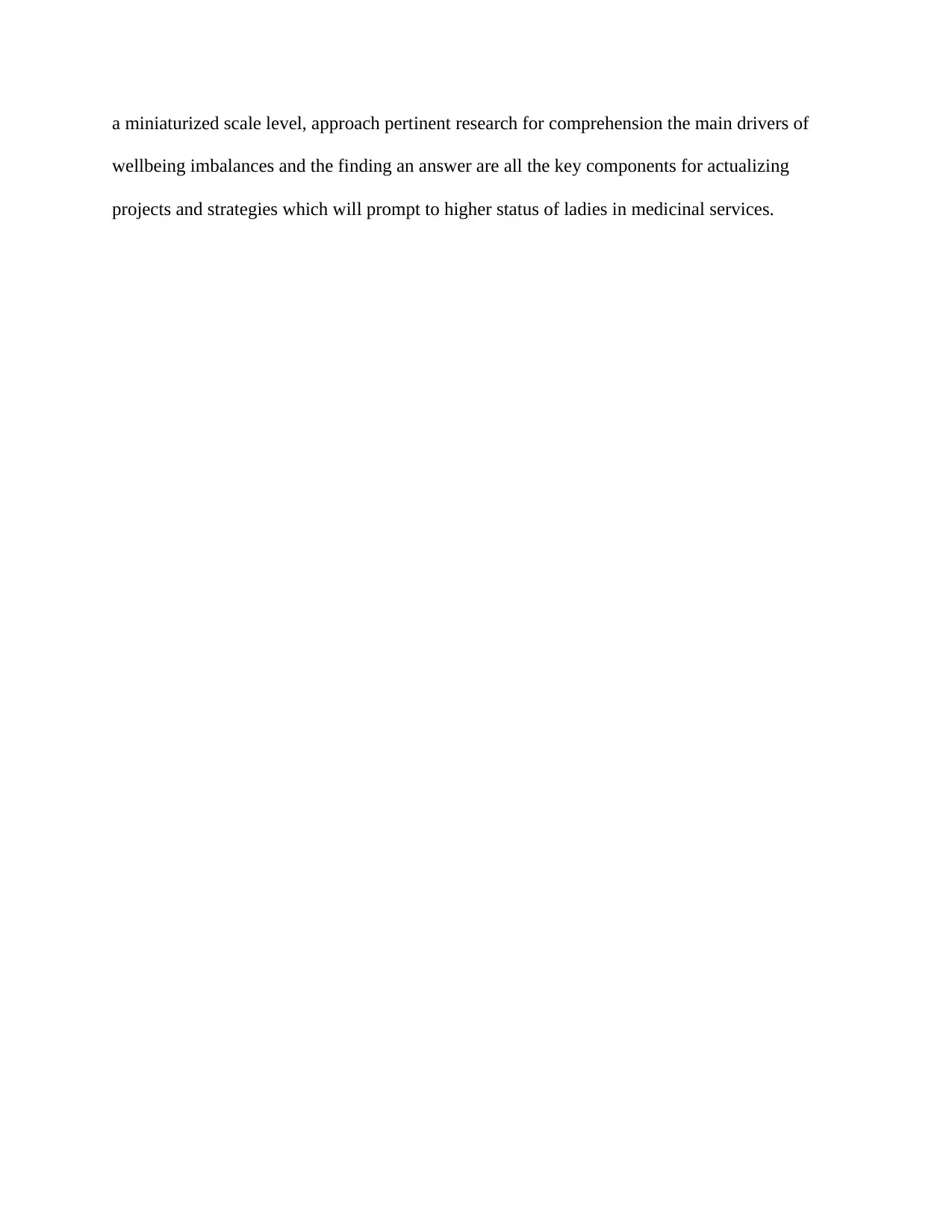
a miniaturized scale level, approach pertinent research for comprehension the main drivers of
wellbeing imbalances and the finding an answer are all the key components for actualizing
projects and strategies which will prompt to higher status of ladies in medicinal services.
wellbeing imbalances and the finding an answer are all the key components for actualizing
projects and strategies which will prompt to higher status of ladies in medicinal services.
⊘ This is a preview!⊘
Do you want full access?
Subscribe today to unlock all pages.

Trusted by 1+ million students worldwide
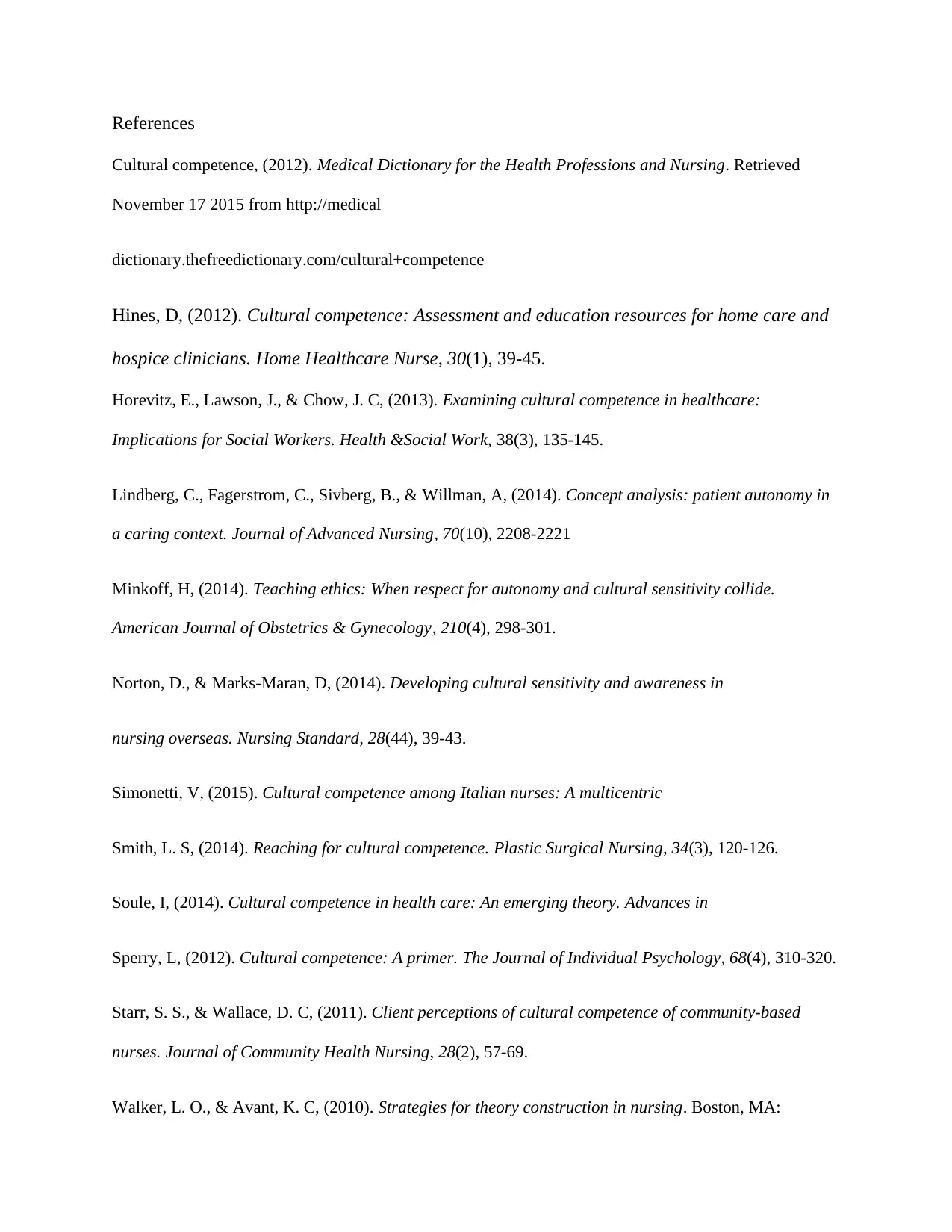
References
Cultural competence, (2012). Medical Dictionary for the Health Professions and Nursing. Retrieved
November 17 2015 from http://medical
dictionary.thefreedictionary.com/cultural+competence
Hines, D, (2012). Cultural competence: Assessment and education resources for home care and
hospice clinicians. Home Healthcare Nurse, 30(1), 39-45.
Horevitz, E., Lawson, J., & Chow, J. C, (2013). Examining cultural competence in healthcare:
Implications for Social Workers. Health &Social Work, 38(3), 135-145.
Lindberg, C., Fagerstrom, C., Sivberg, B., & Willman, A, (2014). Concept analysis: patient autonomy in
a caring context. Journal of Advanced Nursing, 70(10), 2208-2221
Minkoff, H, (2014). Teaching ethics: When respect for autonomy and cultural sensitivity collide.
American Journal of Obstetrics & Gynecology, 210(4), 298-301.
Norton, D., & Marks-Maran, D, (2014). Developing cultural sensitivity and awareness in
nursing overseas. Nursing Standard, 28(44), 39-43.
Simonetti, V, (2015). Cultural competence among Italian nurses: A multicentric
Smith, L. S, (2014). Reaching for cultural competence. Plastic Surgical Nursing, 34(3), 120-126.
Soule, I, (2014). Cultural competence in health care: An emerging theory. Advances in
Sperry, L, (2012). Cultural competence: A primer. The Journal of Individual Psychology, 68(4), 310-320.
Starr, S. S., & Wallace, D. C, (2011). Client perceptions of cultural competence of community-based
nurses. Journal of Community Health Nursing, 28(2), 57-69.
Walker, L. O., & Avant, K. C, (2010). Strategies for theory construction in nursing. Boston, MA:
Cultural competence, (2012). Medical Dictionary for the Health Professions and Nursing. Retrieved
November 17 2015 from http://medical
dictionary.thefreedictionary.com/cultural+competence
Hines, D, (2012). Cultural competence: Assessment and education resources for home care and
hospice clinicians. Home Healthcare Nurse, 30(1), 39-45.
Horevitz, E., Lawson, J., & Chow, J. C, (2013). Examining cultural competence in healthcare:
Implications for Social Workers. Health &Social Work, 38(3), 135-145.
Lindberg, C., Fagerstrom, C., Sivberg, B., & Willman, A, (2014). Concept analysis: patient autonomy in
a caring context. Journal of Advanced Nursing, 70(10), 2208-2221
Minkoff, H, (2014). Teaching ethics: When respect for autonomy and cultural sensitivity collide.
American Journal of Obstetrics & Gynecology, 210(4), 298-301.
Norton, D., & Marks-Maran, D, (2014). Developing cultural sensitivity and awareness in
nursing overseas. Nursing Standard, 28(44), 39-43.
Simonetti, V, (2015). Cultural competence among Italian nurses: A multicentric
Smith, L. S, (2014). Reaching for cultural competence. Plastic Surgical Nursing, 34(3), 120-126.
Soule, I, (2014). Cultural competence in health care: An emerging theory. Advances in
Sperry, L, (2012). Cultural competence: A primer. The Journal of Individual Psychology, 68(4), 310-320.
Starr, S. S., & Wallace, D. C, (2011). Client perceptions of cultural competence of community-based
nurses. Journal of Community Health Nursing, 28(2), 57-69.
Walker, L. O., & Avant, K. C, (2010). Strategies for theory construction in nursing. Boston, MA:
Paraphrase This Document
Need a fresh take? Get an instant paraphrase of this document with our AI Paraphraser

Pearson.
1 out of 11
Your All-in-One AI-Powered Toolkit for Academic Success.
+13062052269
info@desklib.com
Available 24*7 on WhatsApp / Email
![[object Object]](/_next/static/media/star-bottom.7253800d.svg)
Unlock your academic potential
Copyright © 2020–2026 A2Z Services. All Rights Reserved. Developed and managed by ZUCOL.